In Silico and In Vitro Evaluation of δ-cadinene from Decatropis bicolor as a Selective Inhibitor of Human Cell Adhesion and Invasion Proteins
Simple Summary
Abstract
1. Introduction
2. Materials and Methods
2.1. Preparation of δ-cadinene Ligand
2.2. Crystallographic Structures of MMP-9, CD44 and ZEB-2
2.3. Acquisition and Validation of 3D Structural Models for Human MMP-2 and N-cadherin
2.4. Receptor Preparation and Molecular Docking Simulation
2.5. Validation of Molecular Docking
2.6. Molecular Dynamics Simulation
2.7. MDS Trajectory Analysis
2.8. Energetic Contribution Analysis
2.9. Cell Culture and Reagents
2.10. Treatments
2.11. Cytotoxicity Assay
2.12. Predicted IC50 of δ-cadinene
2.13. Selective-Index
2.14. Cell Morphology Analysis
2.15. MMP-2 Enzyme Activity
2.16. Cell Invasion Assay
2.17. Statistical Analysis
3. Results
3.1. Validation of 3D MMP-2 and N-Cadherin Models
3.2. Validation of the Molecular Docking Method
3.3. Molecular Docking Analysis of δ-cadinene
3.4. Blind Molecular Docking Analysis of δ-cadinene
3.5. Molecular Dynamics Analysis of Simulations
3.6. Effect of δ-cadinene on Cell Viability of MDA-MB-231 and MCF10-A Cell Lines
3.7. Effect of δ-cadinene on the Morphology of MDA-MB-231 and MCF10-A Cell Lines
3.8. Effect of δ-Cadinene on the Invasion of the MDA-MB-231 Cell Line
4. Discussion
5. Conclusions
Supplementary Materials
Author Contributions
Funding
Institutional Review Board Statement
Informed Consent Statement
Data Availability Statement
Acknowledgments
Conflicts of Interest
Abbreviations
| BC | Breast cancer |
| DMEM | Dulbecco’s modified Eagle’s medium |
| DMSO | Dimethyl sulfoxide |
| ECM | Extracellular matrix |
| EMT | Epithelial-to-mesenchymal transition |
| EO | Essential oil |
| EOs | Essential oils |
| FBS | Fetal bovine serum |
| MD | Molecular docking |
| MDS | Molecular dynamics simulations |
| MMPs | Matrix metalloproteinases |
| Rg | Radius of gyration |
| RMSD | Root mean square deviation |
| RMSF | Root mean square fluctuation |
| SI | Selectivity index |
| SEM | Standard error of mean |
References
- Rakha, E.A.; Green, A.R. Molecular Classification of Breast Cancer: What the Pathologist Needs to Know. Pathology 2017, 49, 111–119. [Google Scholar] [CrossRef] [PubMed]
- Coughlin, S.S. Epidemiology of Breast Cancer in Women. Adv. Exp. Med. Biol. 2019, 1152, 9–29. [Google Scholar] [CrossRef] [PubMed]
- Jin, L.; Han, B.; Siegel, E.; Cui, Y.; Giuliano, A.; Cui, X. Breast Cancer Lung Metastasis: Molecular Biology and Therapeutic Implications. Cancer Biol. Ther. 2018, 19, 858–868. [Google Scholar] [CrossRef]
- Heerboth, S.; Housman, G.; Leary, M.; Longacre, M.; Byler, S.; Lapinska, K.; Willbanks, A.; Sarkar, S. EMT and Tumor Metastasis. Clin. Transl. Med. 2015, 4, 6. [Google Scholar] [CrossRef] [PubMed]
- Kai, F.; Drain, A.P.; Weaver, V.M. The Extracellular Matrix Modulates the Metastatic Journey. Dev. Cell 2019, 49, 332–346. [Google Scholar] [CrossRef]
- Chen, T.; You, Y.; Jiang, H.; Wang, Z.Z. Epithelial-Mesenchymal Transition (EMT): A Biological Process in the Development, Stem Cell Differentiation, and Tumorigenesis. J. Cell. Physiol. 2017, 232, 3261–3272. [Google Scholar] [CrossRef]
- Fardi, M.; Alivand, M.; Baradaran, B.; Farshdousti Hagh, M.; Solali, S. The Crucial Role of ZEB2: From Development to Epithelial-to-Mesenchymal Transition and Cancer Complexity. J. Cell. Physiol. 2019, 234, 14783–14799. [Google Scholar] [CrossRef]
- Ribatti, D.; Tamma, R.; Annese, T. Epithelial-Mesenchymal Transition in Cancer: A Historical Overview. Transl. Oncol. 2020, 13, 100773. [Google Scholar] [CrossRef]
- Gu, J.; Chen, D.; Li, Z.; Yang, Y.; Ma, Z.; Huang, G. Prognosis Assessment of CD44+/CD24− in Breast Cancer Patients: A Systematic Review and Meta-Analysis. Arch. Gynecol. Obstet. 2022, 306, 1147–1160. [Google Scholar] [CrossRef]
- Błaszczak, E.; Miziak, P.; Odrzywolski, A.; Baran, M.; Gumbarewicz, E.; Stepulak, A. Triple-Negative Breast Cancer Progression and Drug Resistance in the Context of Epithelial-Mesenchymal Transition. Cancers 2025, 17, 228. [Google Scholar] [CrossRef]
- Miller, K.D.; Nogueira, L.; Mariotto, A.B.; Rowland, J.H.; Yabroff, K.R.; Alfano, C.M.; Jemal, A.; Kramer, J.L.; Siegel, R.L. Cancer Treatment and Survivorship Statistics, 2019. CA. Cancer J. Clin. 2019, 69, 363–385. [Google Scholar] [CrossRef]
- Sharma, M.; Grewal, K.; Jandrotia, R.; Batish, D.R.; Singh, H.P.; Kohli, R.K. Essential Oils as Anticancer Agents: Potential Role in Malignancies, Drug Delivery Mechanisms, and Immune System Enhancement. Biomed. Pharmacother. Biomed. Pharmacother. 2022, 146, 112514. [Google Scholar] [CrossRef]
- Corasaniti, M.T.; Bagetta, G.; Morrone, L.A.; Tonin, P.; Hamamura, K.; Hayashi, T.; Guida, F.; Maione, S.; Scuteri, D. Efficacy of Essential Oils in Relieving Cancer Pain: A Systematic Review and Meta-Analysis. Int. J. Mol. Sci. 2023, 24, 7085. [Google Scholar] [CrossRef]
- Blowman, K.; Magalhães, M.; Lemos, M.F.L.; Cabral, C.; Pires, I.M. Anticancer Properties of Essential Oils and Other Natural Products. Evid.-Based Complement. Altern. Med. ECAM 2018, 2018, 3149362. [Google Scholar] [CrossRef] [PubMed]
- Aziz, Z.A.A.; Ahmad, A.; Setapar, S.H.M.; Karakucuk, A.; Azim, M.M.; Lokhat, D.; Rafatullah, M.; Ganash, M.; Kamal, M.A.; Ashraf, G.M. Essential Oils: Extraction Techniques, Pharmaceutical and Therapeutic Potential—A Review. Curr. Drug Metab. 2018, 19, 1100–1110. [Google Scholar] [CrossRef]
- Mustapa, M.A.; Guswenrivo, I.; Zuhrotun, A.; Ikram, N.K.K.; Muchtaridi, M. Anti-Breast Cancer Activity of Essential Oil: A Systematic Review. Appl. Sci. 2022, 12, 12738. [Google Scholar] [CrossRef]
- Break, M.K.B.; Hussein, W.; Huwaimel, B.; Alafnan, A.; Almansour, K.; Alafnan, D.; Alshammari, A.S.; Alanazi, I.A.; Alshammari, D.S.; Alanzi, F.S.; et al. Artemisia Sieberi Besser Essential Oil Inhibits the Growth and Migration of Breast Cancer Cells via Induction of S-Phase Arrest, Caspase-Independent Cell Death and Downregulation of ERK. J. Ethnopharmacol. 2023, 312, 116492. [Google Scholar] [CrossRef]
- Xing, X.; Ma, J.-H.; Fu, Y.; Zhao, H.; Ye, X.-X.; Han, Z.; Jia, F.-J.; Li, X. Essential Oil Extracted from Erythrina Corallodendron L. Leaves Inhibits the Proliferation, Migration, and Invasion of Breast Cancer Cells. Medicine 2019, 98, e17009. [Google Scholar] [CrossRef]
- Estanislao Gómez, C.C.; Aquino Carreño, A.; Pérez Ishiwara, D.G.; San Martín Martínez, E.; Morales López, J.; Pérez Hernández, N.; Gómez García, M.C. Decatropis Bicolor (Zucc.) Radlk Essential Oil Induces Apoptosis of the MDA-MB-231 Breast Cancer Cell Line. BMC Complement. Altern. Med. 2016, 16, 266. [Google Scholar] [CrossRef] [PubMed]
- Ramírez Celis, C. Caracterización Química y Evaluación del Efecto Citotóxico de las Sub-Fracciones de Decatropis Bicolor en Líneas Celulares de Cáncer de Mama. Ph D. Thesis, Instituto Politécnico Nacional, Mexico City, Mexico, 2020. [Google Scholar]
- Hui, L.-M.; Zhao, G.-D.; Zhao, J.-J. δ-Cadinene Inhibits the Growth of Ovarian Cancer Cells via Caspase-Dependent Apoptosis and Cell Cycle Arrest. Int. J. Clin. Exp. Pathol. 2015, 8, 6046–6056. [Google Scholar] [PubMed]
- O’Boyle, N.M.; Banck, M.; James, C.A.; Morley, C.; Vandermeersch, T.; Hutchison, G.R. Open Babel: An Open Chemical Toolbox. J. Cheminformatics 2011, 3, 33. [Google Scholar] [CrossRef]
- Berman, H.M.; Battistuz, T.; Bhat, T.N.; Bluhm, W.F.; Bourne, P.E.; Burkhardt, K.; Feng, Z.; Gilliland, G.L.; Iype, L.; Jain, S.; et al. The Protein Data Bank. Acta Crystallogr. D Biol. Crystallogr. 2002, 58, 899–907. [Google Scholar] [CrossRef]
- Varadi, M.; Bertoni, D.; Magana, P.; Paramval, U.; Pidruchna, I.; Radhakrishnan, M.; Tsenkov, M.; Nair, S.; Mirdita, M.; Yeo, J.; et al. AlphaFold Protein Structure Database in 2024: Providing Structure Coverage for over 214 Million Protein Sequences. Nucleic Acids Res. 2024, 52, D368–D375. [Google Scholar] [CrossRef]
- Lu, C.-H.; Chen, C.-C.; Yu, C.-S.; Liu, Y.-Y.; Liu, J.-J.; Wei, S.-T.; Lin, Y.-F. MIB2: Metal Ion-Binding Site Prediction and Modeling Server. Bioinforma. Oxf. Engl. 2022, 38, 4428–4429. [Google Scholar] [CrossRef] [PubMed]
- Laskowski, R.A.; Jabłońska, J.; Pravda, L.; Vařeková, R.S.; Thornton, J.M. PDBsum: Structural Summaries of PDB Entries. Protein Sci. Publ. Protein Soc. 2018, 27, 129–134. [Google Scholar] [CrossRef] [PubMed]
- Wiederstein, M.; Sippl, M.J. ProSA-Web: Interactive Web Service for the Recognition of Errors in Three-Dimensional Structures of Proteins. Nucleic Acids Res. 2007, 35, W407–W410. [Google Scholar] [CrossRef] [PubMed]
- Colovos, C.; Yeates, T.O. Verification of Protein Structures: Patterns of Nonbonded Atomic Interactions. Protein Sci. Publ. Protein Soc. 1993, 2, 1511–1519. [Google Scholar] [CrossRef]
- Pettersen, E.F.; Goddard, T.D.; Huang, C.C.; Couch, G.S.; Greenblatt, D.M.; Meng, E.C.; Ferrin, T.E. UCSF Chimera--a Visualization System for Exploratory Research and Analysis. J. Comput. Chem. 2004, 25, 1605–1612. [Google Scholar] [CrossRef]
- Rosignoli, S.; Paiardini, A. Boosting the Full Potential of PyMOL with Structural Biology Plugins. Biomolecules 2022, 12, 1764. [Google Scholar] [CrossRef]
- Prasada Rao, C.M.; Silakabattini, K.; Narapusetty, N.; Marabathuni, V.J.P.; Thejomoorthy, K.; Rajeswari, T.; Sabitha, Y. Insights from the Molecular Docking and Simulation Analysis of P38 MAPK Phytochemical Inhibitor Complexes. Bioinformation 2023, 19, 323–330. [Google Scholar] [CrossRef]
- Trott, O.; Olson, A.J. AutoDock Vina: Improving the Speed and Accuracy of Docking with a New Scoring Function, Efficient Optimization and Multithreading. J. Comput. Chem. 2010, 31, 455–461. [Google Scholar] [CrossRef]
- Eslami, M.; Nezafat, N.; Khajeh, S.; Mostafavi-Pour, Z.; Bagheri Novir, S.; Negahdaripour, M.; Ghasemi, Y.; Razban, V. Deep Analysis of N-Cadherin/ADH-1 Interaction: A Computational Survey. J. Biomol. Struct. Dyn. 2019, 37, 210–228. [Google Scholar] [CrossRef] [PubMed]
- Sargazi, A.; Shiri, F.; Keikha, S.; Majd, M.H. Hyaluronan Magnetic Nanoparticle for Mitoxantrone Delivery toward CD44-Positive Cancer Cells. Colloids Surf. B Biointerfaces 2018, 171, 150–158. [Google Scholar] [CrossRef]
- Khalil, H.E.; Ibrahim, H.-I.M.; El-Fass, K.A.; Akrawi, S.H.; Morsy, M.A. Orientin Alleviates Liver Inflammation via Downregulation of ZEB-2/PTEN Markers—Hepatic Stellate Cells Approach. Appl. Sci. 2022, 12, 2725. [Google Scholar] [CrossRef]
- Huynh, C.B.; Nagaarudkumaran, N.; Kalyaanamoorthy, S.; Ngo, W. In Silico and In Vitro Approach for Validating the Inhibition of Matrix Metalloproteinase-9 by Quercetin. Eye Contact Lens 2023, 49, 193–198. [Google Scholar] [CrossRef]
- Kumar, G.; Patnaik, R. Inhibition of Gelatinases (MMP-2 and MMP-9) by Withania Somnifera Phytochemicals Confers Neuroprotection in Stroke: An In Silico Analysis. Interdiscip. Sci. Comput. Life Sci. 2018, 10, 722–733. [Google Scholar] [CrossRef] [PubMed]
- Sousa da Silva, A.W.; Vranken, W.F. ACPYPE-AnteChamber PYthon Parser interface. BMC Res. Notes 2012, 5, 367. [Google Scholar] [CrossRef] [PubMed]
- Abraham, M.J.; Murtola, T.; Schulz, R.; Páll, S.; Smith, J.C.; Hess, B.; Lindahl, E. GROMACS: High Performance Molecular Simulations through Multi-Level Parallelism from Laptops to Supercomputers. SoftwareX 2015, 1–2, 19–25. [Google Scholar] [CrossRef]
- Kumari, R.; Kumar, R.; Open Source Drug Discovery Consortium; Lynn, A. G_mmpbsa—A GROMACS Tool for High-Throughput MM-PBSA Calculations. J. Chem. Inf. Model. 2014, 54, 1951–1962. [Google Scholar] [CrossRef]
- Roshanazadeh, M.; Babaahmadi Rezaei, H.; Rashidi, M. Quercetin Synergistically Potentiates the Anti-Metastatic Effect of 5-Fluorouracil on the MDA-MB-231 Breast Cancer Cell Line. Iran. J. Basic Med. Sci. 2021, 24, 928–934. [Google Scholar] [CrossRef]
- Eliaser, E.M.; Mohd Hashim, N.; Rukayadi, Y.; Abdull Razis, A.F. 7-Geranyloxycinnamic Acid Isolated from Melicope Lunu-Ankenda Leaves Perturbs Colon Cancer and Breast Cancer Cell Lines’ Growth via Induction of Apoptotic Pathway. Molecules 2023, 28, 3612. [Google Scholar] [CrossRef]
- Mosmann, T. Rapid Colorimetric Assay for Cellular Growth and Survival: Application to Proliferation and Cytotoxicity Assays. J. Immunol. Methods 1983, 65, 55–63. [Google Scholar] [CrossRef] [PubMed]
- Cadow, J.; Born, J.; Manica, M.; Oskooei, A.; Rodríguez Martínez, M. PaccMann: A Web Service for Interpretable Anticancer Compound Sensitivity Prediction. Nucleic Acids Res. 2020, 48, W502–W508. [Google Scholar] [CrossRef] [PubMed]
- Tronina, T.; Bartmańska, A.; Popłoński, J.; Rychlicka, M.; Sordon, S.; Filip-Psurska, B.; Milczarek, M.; Wietrzyk, J.; Huszcza, E. Prenylated Flavonoids with Selective Toxicity against Human Cancers. Int. J. Mol. Sci. 2023, 24, 7408. [Google Scholar] [CrossRef] [PubMed]
- Qi, Q.; Lu, N.; Wang, X.; Gu, H.; Yang, Y.; Liu, W.; Li, C.; You, Q.; Guo, Q. Anti-Invasive Effect of Gambogic Acid in MDA-MB-231 Human Breast Carcinoma Cells. Biochem. Cell Biol. Biochim. Biol. Cell. 2008, 86, 386–395. [Google Scholar] [CrossRef]
- Schindelin, J.; Arganda-Carreras, I.; Frise, E.; Kaynig, V.; Longair, M.; Pietzsch, T.; Preibisch, S.; Rueden, C.; Saalfeld, S.; Schmid, B.; et al. Fiji—An Open Source Platform for Biological Image Analysis. Nat. Methods 2012, 9, 676–682. [Google Scholar] [CrossRef]
- Qu, Y.; Liu, H.; Lv, X.; Liu, Y.; Wang, X.; Zhang, M.; Zhang, X.; Li, Y.; Lou, Q.; Li, S.; et al. MicroRNA-16-5p Overexpression Suppresses Proliferation and Invasion as Well as Triggers Apoptosis by Targeting VEGFA Expression in Breast Carcinoma. Oncotarget 2017, 8, 72400–72410. [Google Scholar] [CrossRef]
- Brabletz, T.; Kalluri, R.; Nieto, M.A.; Weinberg, R.A. EMT in Cancer. Nat. Rev. Cancer 2018, 18, 128–134. [Google Scholar] [CrossRef]
- Xu, H.; Niu, M.; Yuan, X.; Wu, K.; Liu, A. CD44 as a Tumor Biomarker and Therapeutic Target. Exp. Hematol. Oncol. 2020, 9, 36. [Google Scholar] [CrossRef]
- Cao, Z.-Q.; Wang, Z.; Leng, P. Aberrant N-Cadherin Expression in Cancer. Biomed. Pharmacother. Biomed. Pharmacother. 2019, 118, 109320. [Google Scholar] [CrossRef]
- Yang, J.; Wu, M.; Fang, H.; Su, Y.; Zhang, L.; Zhou, H. Puerarin Prevents Acute Liver Injury via Inhibiting Inflammatory Responses and ZEB2 Expression. Front. Pharmacol. 2021, 12, 727916. [Google Scholar] [CrossRef] [PubMed]
- Laghezza, A.; Luisi, G.; Caradonna, A.; Di Pizio, A.; Piemontese, L.; Loiodice, F.; Agamennone, M.; Tortorella, P. Virtual Screening Identification and Chemical Optimization of Substituted 2-Arylbenzimidazoles as New Non-Zinc-Binding MMP-2 Inhibitors. Bioorg. Med. Chem. 2020, 28, 115257. [Google Scholar] [CrossRef]
- Pilewskie, M.; Morrow, M. Margins in Breast Cancer: How Much Is Enough? Cancer 2018, 124, 1335–1341. [Google Scholar] [CrossRef]
- Kumari, P.; Ghosh, B.; Biswas, S. Nanocarriers for Cancer-Targeted Drug Delivery. J. Drug Target. 2016, 24, 179–191. [Google Scholar] [CrossRef]
- Tu, S.; Hu, F.; Zhang, J.; Cai, H.; Yang, J. Research Progress on the Signaling Pathway Mechanism of Terpenoids against Breast Cancer. Discov. Oncol. 2025, 16, 433. [Google Scholar] [CrossRef]
- Beeby, E.; Magalhães, M.; Poças, J.; Collins, T.; Lemos, M.F.L.; Barros, L.; Ferreira, I.C.F.R.; Cabral, C.; Pires, I.M. Secondary Metabolites (Essential Oils) from Sand-Dune Plants Induce Cytotoxic Effects in Cancer Cells. J. Ethnopharmacol. 2020, 258, 112803. [Google Scholar] [CrossRef] [PubMed]
- Pérez-Mora, S.; Ocampo-López, J.; Gómez-García, M.d.C.; Salgado-Hernández, S.V.; Flores-Martinez, Y.M.; Pérez-Ishiwara, D.G. Polyphenols from Bacopa Procumbens Nanostructured with Gold Nanoparticles Stimulate Hair Growth Through Apoptosis Modulation in C57BL/6 Mice. Pharmaceutics 2025, 17, 222. [Google Scholar] [CrossRef] [PubMed]
- Pérez-Mora, S.; Pérez-Ishiwara, D.G.; Salgado-Hernández, S.V.; Medel-Flores, M.O.; Reyes-López, C.A.; Rodríguez, M.A.; Sánchez-Monroy, V.; Gómez-García, M.D.C. Entamoeba Histolytica: In Silico and In Vitro Oligomerization of EhHSTF5 Enhances Its Binding to the HSE of the EhPgp5 Gene Promoter. Int. J. Mol. Sci. 2024, 25, 4218. [Google Scholar] [CrossRef]
- Dorantes-Palma, D.; Pérez-Mora, S.; Azuara-Liceaga, E.; Pérez-Rueda, E.; Pérez-Ishiwara, D.G.; Coca-González, M.; Medel-Flores, M.O.; Gómez-García, C. Screening and Structural Characterization of Heat Shock Response Elements (HSEs) in Entamoeba Histolytica Promoters. Int. J. Mol. Sci. 2024, 25, 1319. [Google Scholar] [CrossRef]
- Soto-Sánchez, J.; Pérez-Mora, S.; Ospina-Villa, J.D.; Zavala-Ocampo, L.M. Esters of Quinoxaline-7-Carboxylate 1,4-Di-N-Oxide as Potential Inhibitors of Glycolytic Enzymes of Entamoeba Histolytica: In Silico Approach. Curr. Comput. Aided Drug Des. 2024, 20, 155–169. [Google Scholar] [CrossRef]
- Lempicki, M.D.; Garrigues, R.J.; Hondros, A.D.; Zeczycki, T.N.; Garcia, B.L.; Cavanagh, J.; Harris, T.E.; Meher, A.K. Matrix Metalloproteinase-2 as a Novel Regulator of Glucose Utilization by Adipocytes. Sci. Rep. 2025, 15, 24277. [Google Scholar] [CrossRef]
- Chen, Y.; Sun, Q.; Hao, C.; Guo, R.; Wang, C.; Yang, W.; Zhang, Y.; Wang, F.; Li, W.; Guo, J. Identification of a Novel Variant in N-Cadherin Associated with Dilated Cardiomyopathy. Front. Med. 2022, 9, 944950. [Google Scholar] [CrossRef]
- Vijayababu, M.R.; Arunkumar, A.; Kanagaraj, P.; Venkataraman, P.; Krishnamoorthy, G.; Arunakaran, J. Quercetin Downregulates Matrix Metalloproteinases 2 and 9 Proteins Expression in Prostate Cancer Cells (PC-3). Mol. Cell. Biochem. 2006, 287, 109–116. [Google Scholar] [CrossRef]
- Dalton, C.J.; Lemmon, C.A. Fibronectin: Molecular Structure, Fibrillar Structure and Mechanochemical Signaling. Cells 2021, 10, 2443. [Google Scholar] [CrossRef]
- Jha, S.; Kanaujia, S.P.; Limaye, A.M. Direct Inhibition of Matrix Metalloproteinase-2 (MMP-2) by (-)-Epigallocatechin-3-Gallate: A Possible Role for the Fibronectin Type II Repeats. Gene 2016, 593, 126–130. [Google Scholar] [CrossRef]
- Sanyal, S.; Amin, S.A.; Banerjee, P.; Gayen, S.; Jha, T. A Review of MMP-2 Structures and Binding Mode Analysis of Its Inhibitors to Strategize Structure-Based Drug Design. Bioorg. Med. Chem. 2022, 74, 117044. [Google Scholar] [CrossRef]
- Cheng, X.W.; Kuzuya, M.; Kanda, S.; Maeda, K.; Sasaki, T.; Wang, Q.L.; Tamaya-Mori, N.; Shibata, T.; Iguchi, A. Epigallocatechin-3-Gallate Binding to MMP-2 Inhibits Gelatinolytic Activity without Influencing the Attachment to Extracellular Matrix Proteins but Enhances MMP-2 Binding to TIMP-2. Arch. Biochem. Biophys. 2003, 415, 126–132. [Google Scholar] [CrossRef]
- Liu, K.; Newbury, P.A.; Glicksberg, B.S.; Zeng, W.Z.D.; Paithankar, S.; Andrechek, E.R.; Chen, B. Evaluating Cell Lines as Models for Metastatic Breast Cancer through Integrative Analysis of Genomic Data. Nat. Commun. 2019, 10, 2138. [Google Scholar] [CrossRef]
- Witt, B.L.; Tollefsbol, T.O. Molecular, Cellular, and Technical Aspects of Breast Cancer Cell Lines as a Foundational Tool in Cancer Research. Life 2023, 13, 2311. [Google Scholar] [CrossRef]
- Trebesch, N.; Hasdemir, H.S.; Chen, T.; Wen, P.-C.; Tajkhorshid, E. Molecular Dynamics Simulations of Biological Membranes and Membrane-Associated Phenomena across Scales. Curr. Opin. Struct. Biol. 2025, 93, 103071. [Google Scholar] [CrossRef]
- Krippendorff, B.-F.; Lienau, P.; Reichel, A.; Huisinga, W. Optimizing Classification of Drug-Drug Interaction Potential for CYP450 Isoenzyme Inhibition Assays in Early Drug Discovery. J. Biomol. Screen. 2007, 12, 92–99. [Google Scholar] [CrossRef] [PubMed]
- Irungu, B.N.; Nyangi, M.; Ndombera, F.T. Anticancer Potential of Four Triterpenoids against NCI-60 Human Tumor Cell Lines. Beni-Suef. Univ. J. Basic Appl. Sci. 2024, 13, 50. [Google Scholar] [CrossRef]
- Amaral, M.B.; Hamad, H.A.; V Menon, S.; Kaur, M.; Sivaprasad, G.V.; Kadhum, W.R.; Uthirapathy, S.; Ikram Ullah, M.; Abed Jawad, M.; Fakri Mustafa, Y. The Effect of Cynaropicrin, a Sesquiterpene Lactone, on the Migratory Properties of Triple-Negative Breast Cancer Cells and the Underlying Mechanisms. Avicenna J. Phytomed. 2025. [Google Scholar] [CrossRef]
- Sotillo, W.S.; Villagomez, R.; Smiljanic, S.; Huang, X.; Malakpour, A.; Kempengren, S.; Rodrigo, G.; Almanza, G.; Sterner, O.; Oredsson, S. Anti-Cancer Stem Cell Activity of a Sesquiterpene Lactone Isolated from Ambrosia Arborescens and of a Synthetic Derivative. PLoS ONE 2017, 12, e0184304. [Google Scholar] [CrossRef] [PubMed]
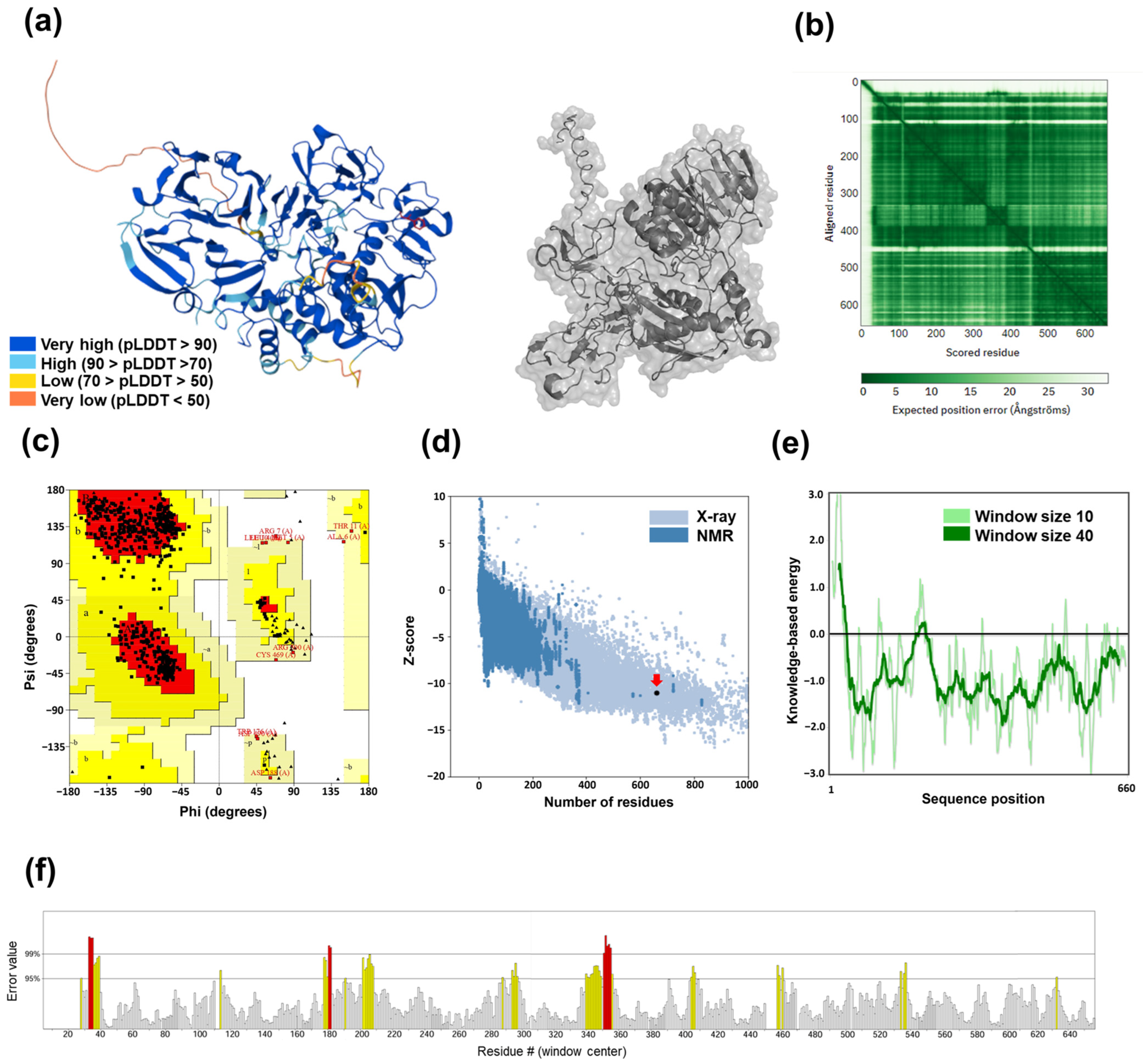

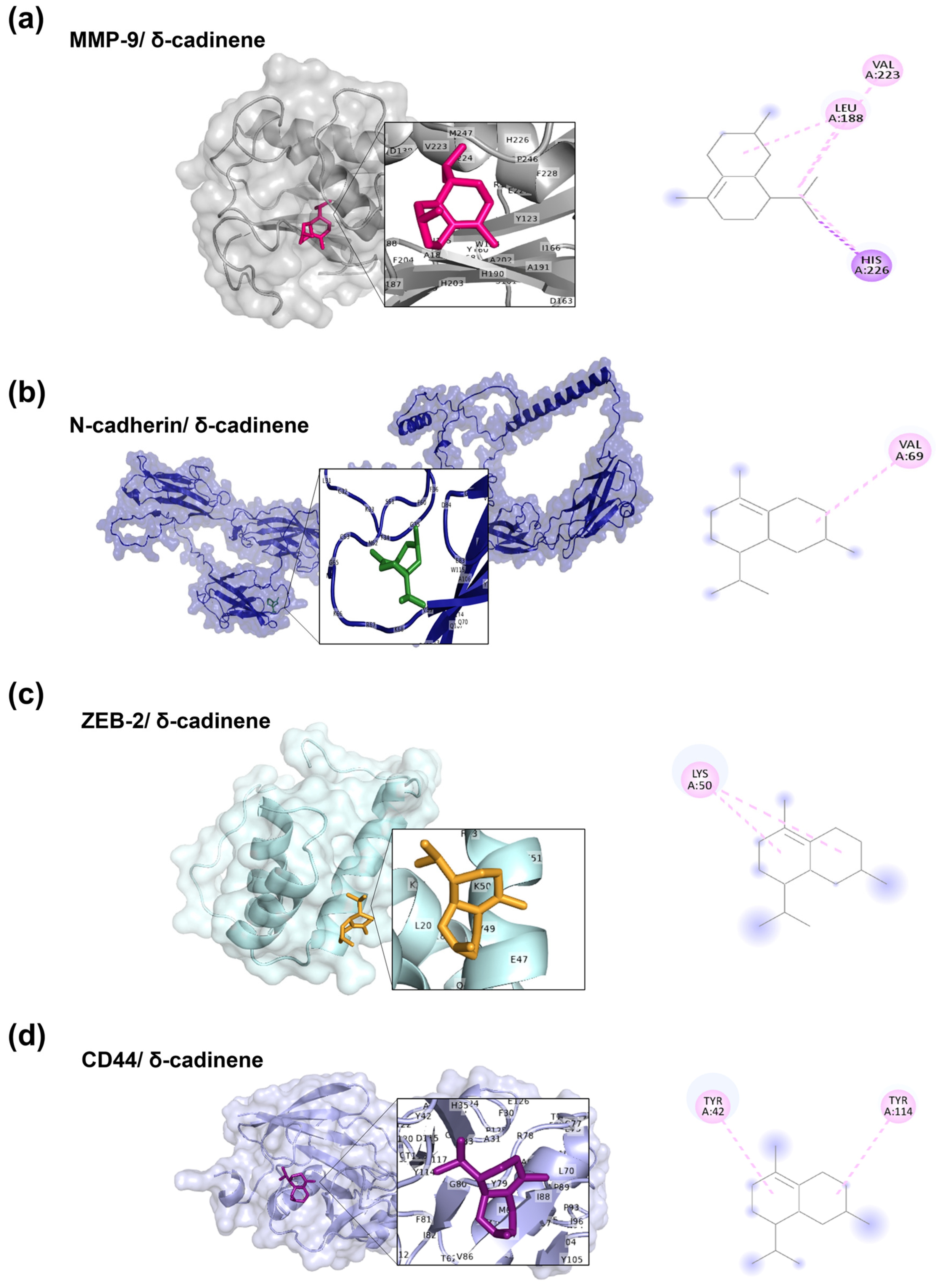
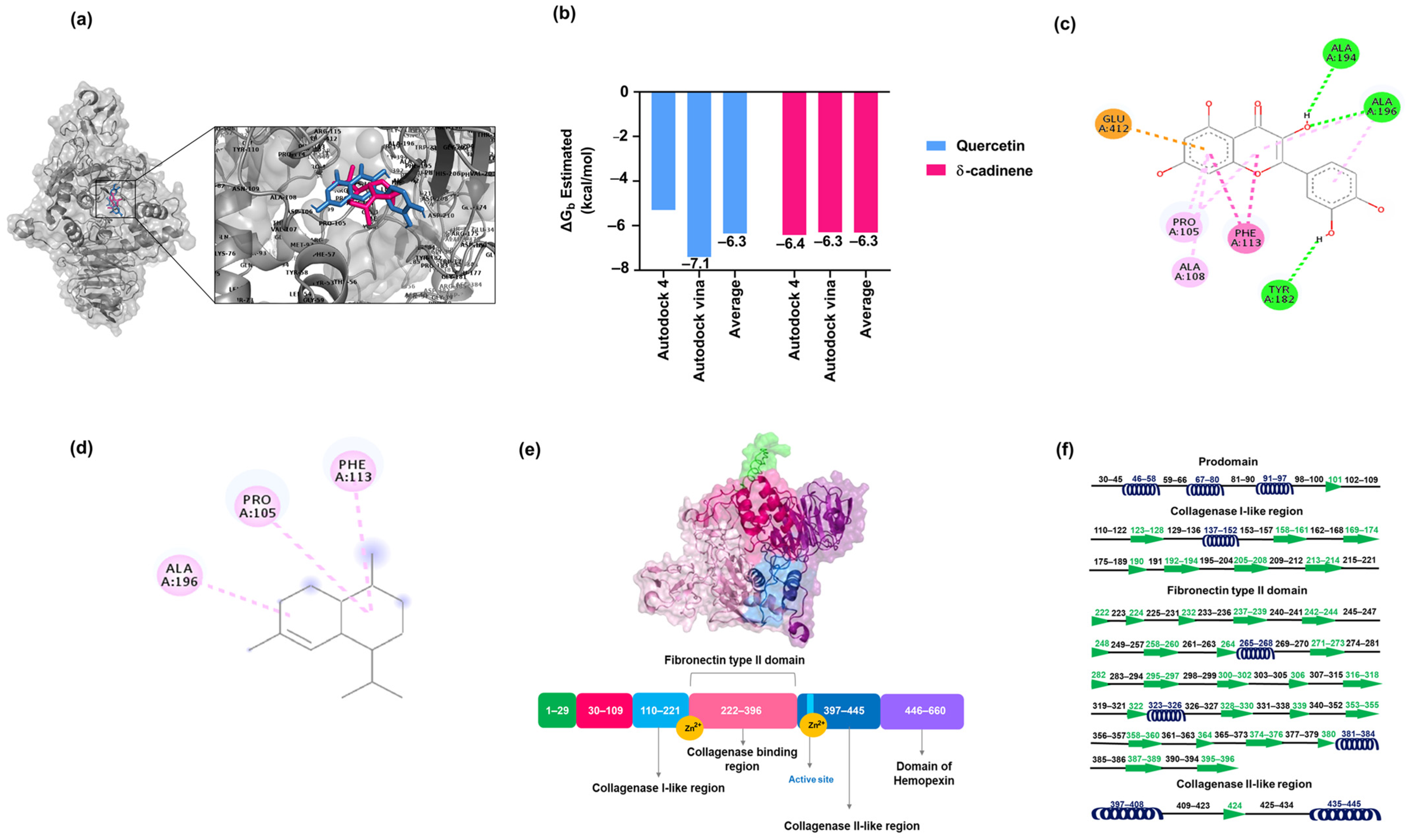
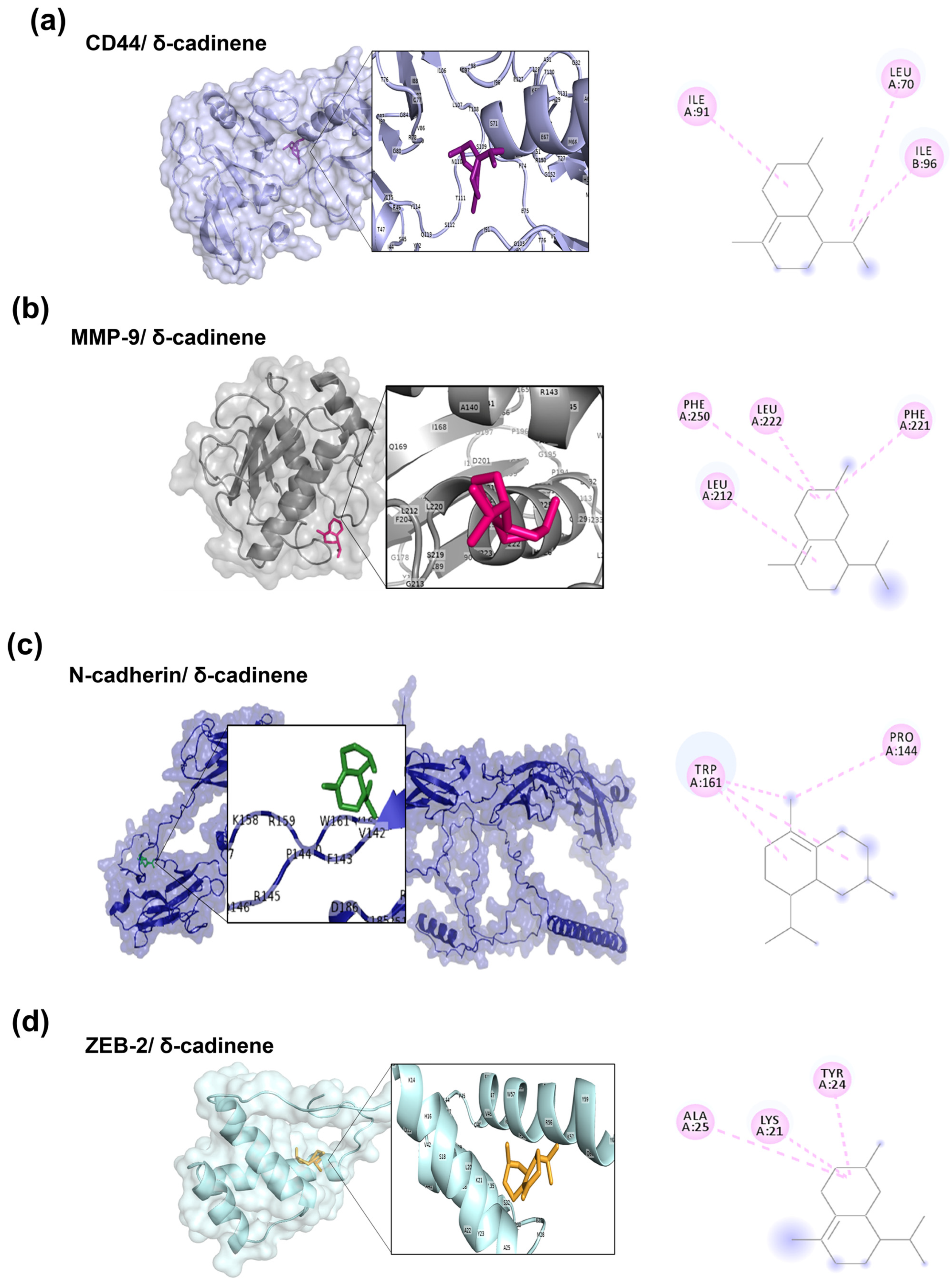

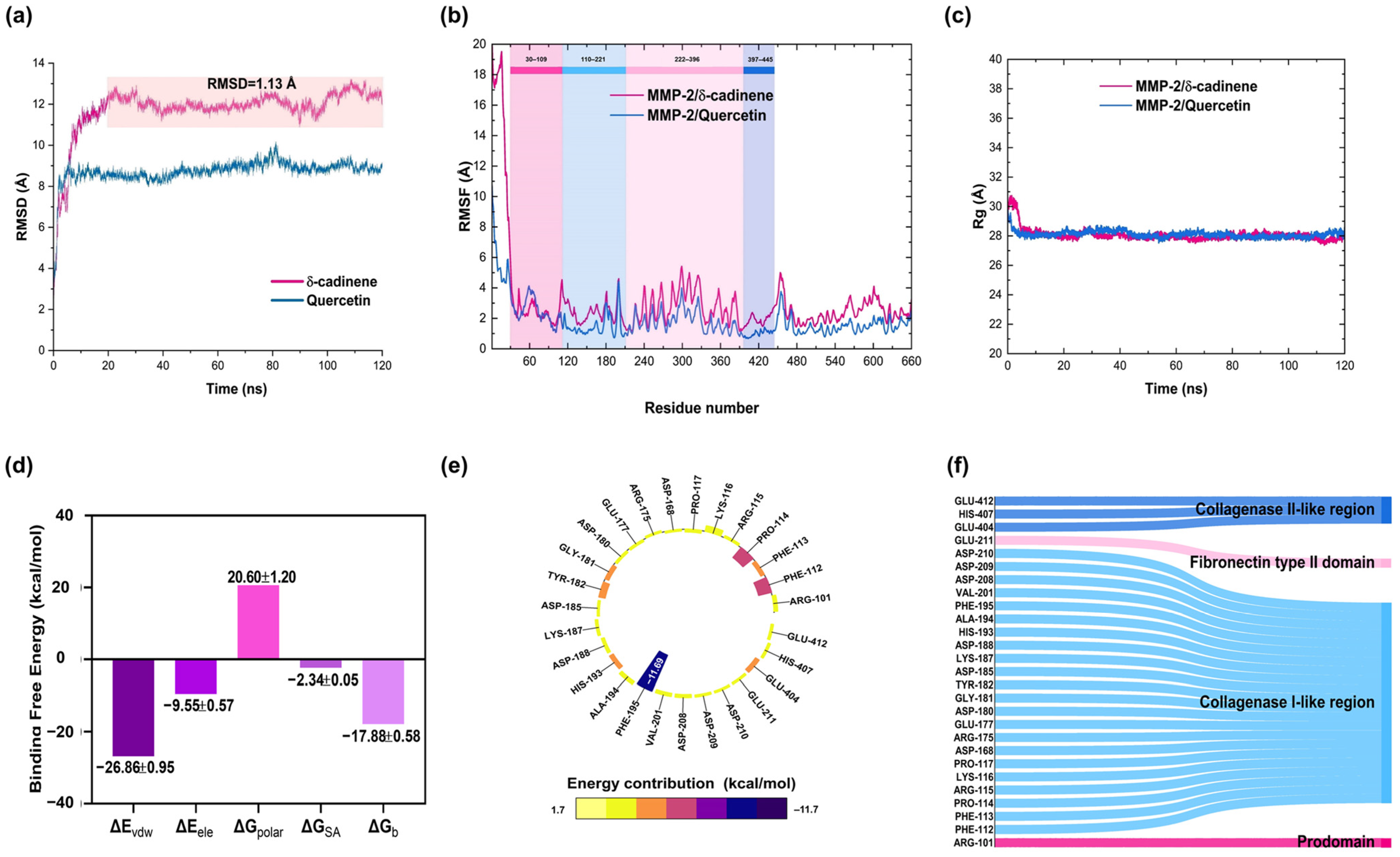
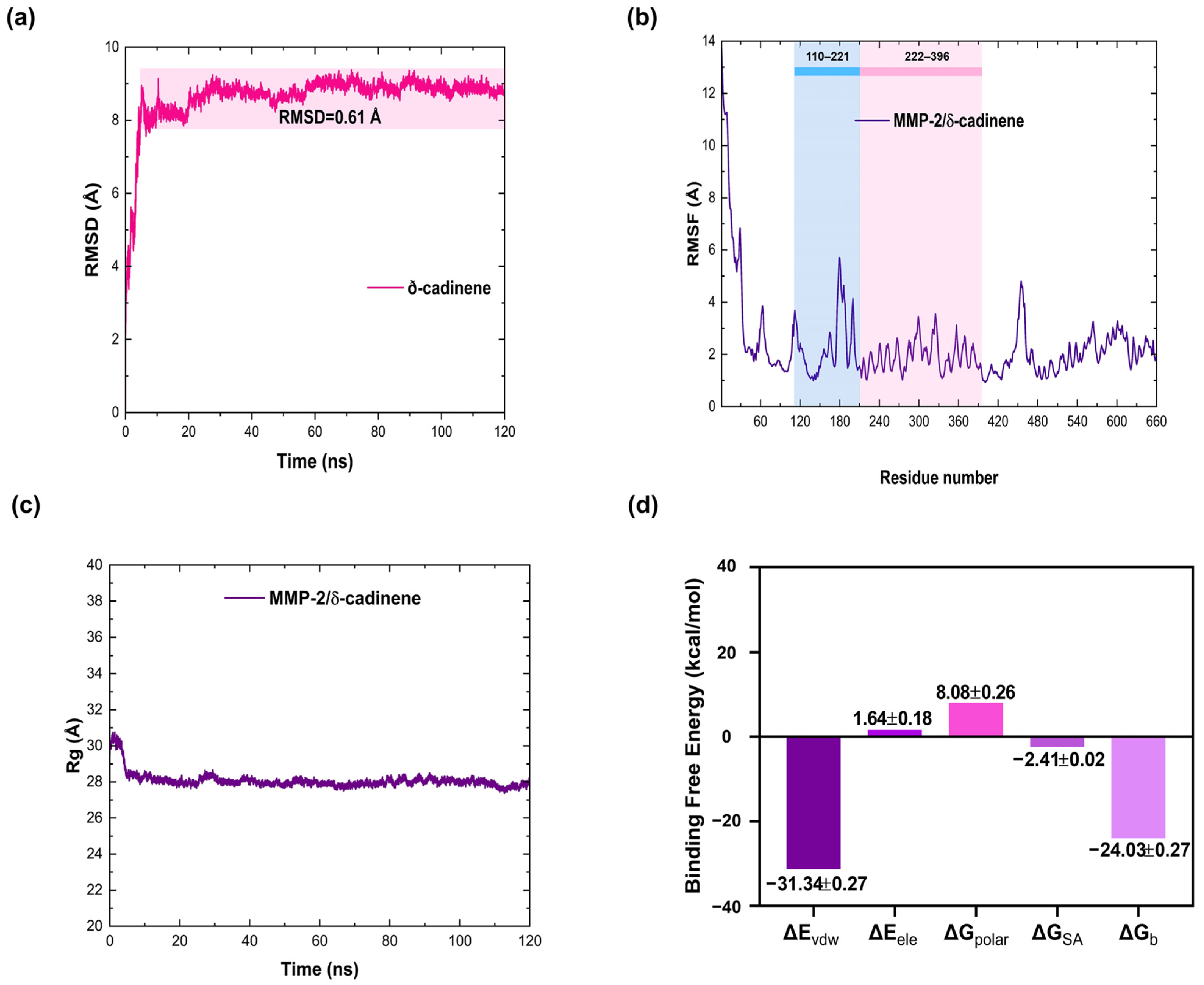
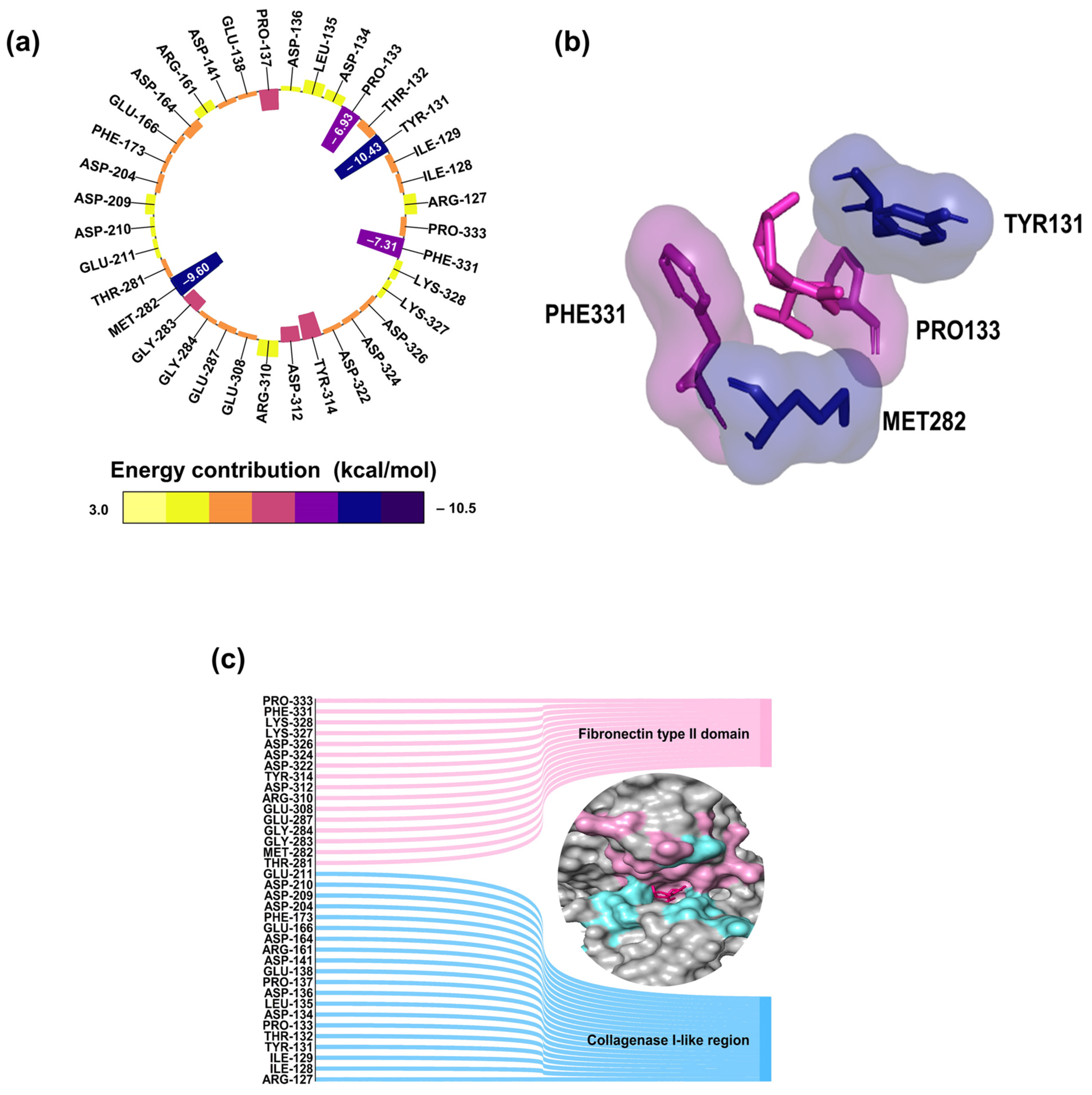
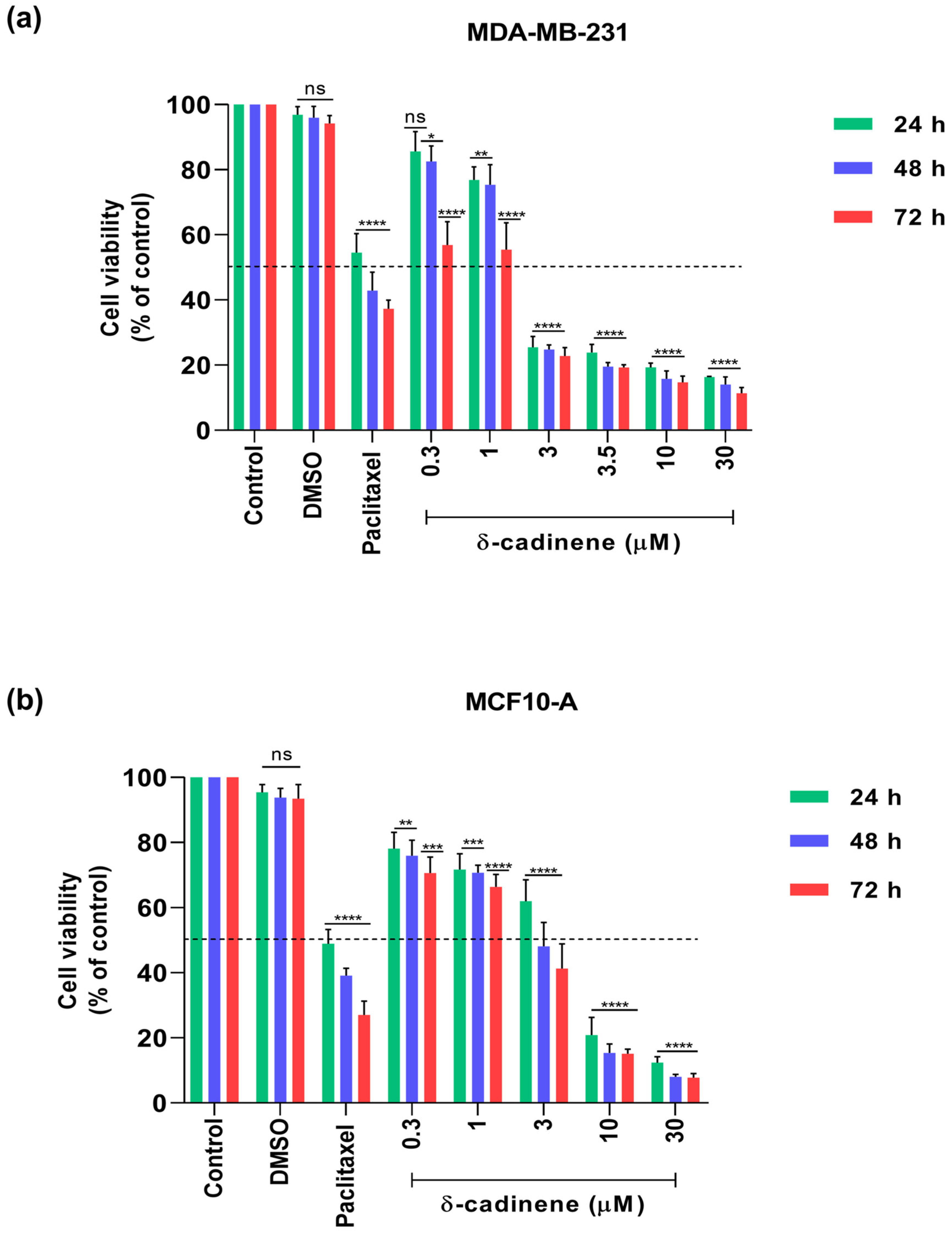
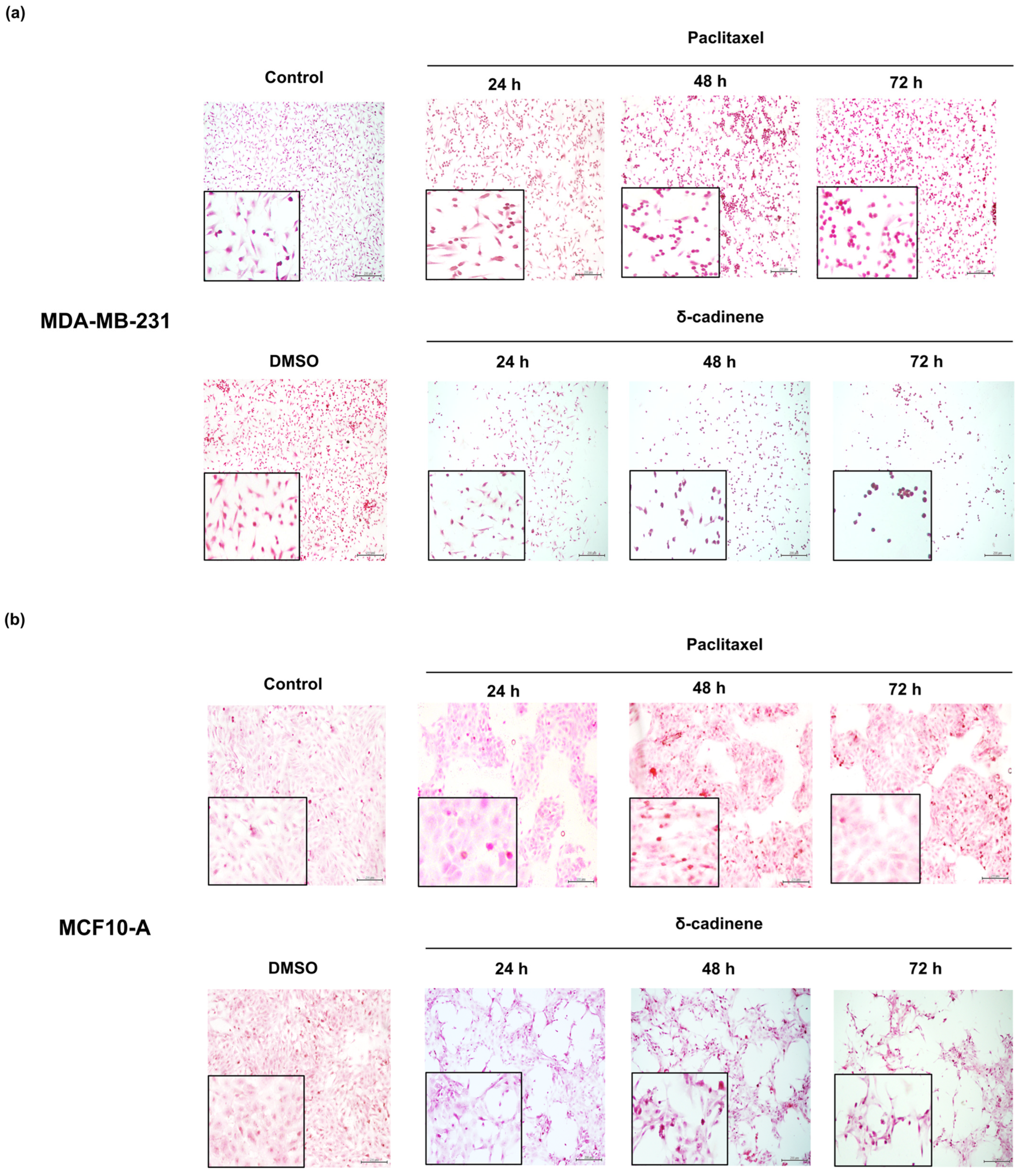
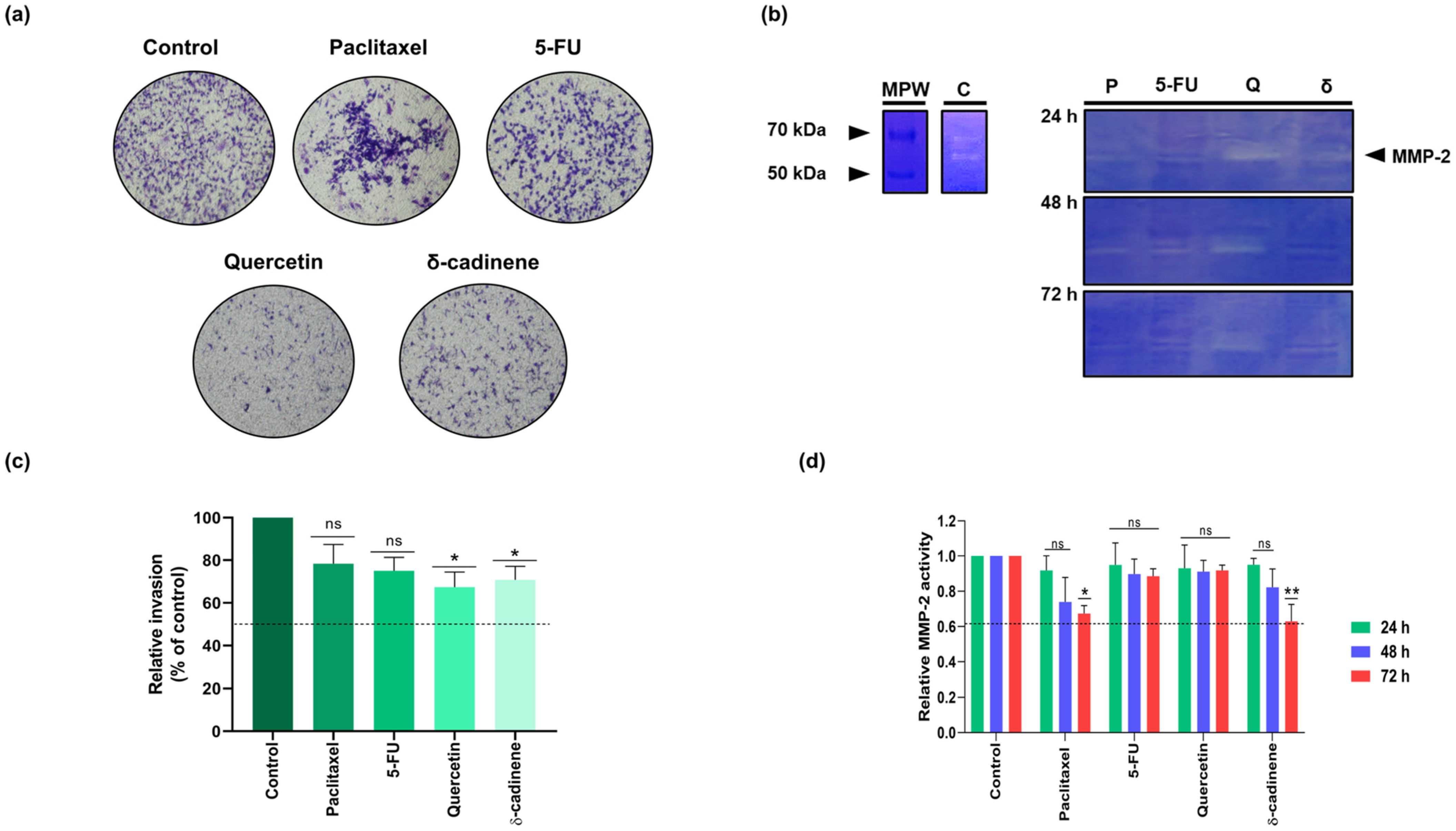
| Ligand | Protein | ΔGb Estimated (kcal/mol) | Binding Site | Validation | ||||
|---|---|---|---|---|---|---|---|---|
| Autodock | Vina | Average | Molecular Interactions | Amino Acid Residues | Binding Site | Reference | ||
| Quercetin | MMP-9 | −7.6 | −9.9 | −8.7 | Hydrogen bonds Alkyl π-Alkyl π-Sigma π-π Stacked | Leu188, Ala189, Val223, His226, Tyr245 Met247 | Leu188, Ala189, Glu227, Met247 | [36] |
| MMP-2 | −5.3 | −7.1 | −6.3 | Hydrogen bonds π-Alkyl π-Anion π-π T-shaped | Pro105, Ala108, Phe113, Tyr182, Ala194, Ala 196, Glu412 | Arg38, Ile41, Asp45, Gly81, Leu83, Ala84, Ala86, Val117, Glu121, Pro134, Ala136, Ala139 | [37] | |
| ADH-1 (Exherin) | N-cadherin | −7.7 | −7.3 | −7.5 | Hydrogen bonds | Val58, Phe60, Val69, Tyr71, Glu83, Asp84 | Trp2, Arg23, Arg25, Glu89 | [33] |
| Orientin | ZEB-2 | −5.4 | −5.1 | −5.2 | Hydrogen bonds Carbon–Hydrogen bonds π-Sigma π-Alkyl | Leu36, Ser39, Ile40, Leu44 | Thr19, Leu20, Ala32, Thr49, Pro51 | [35] |
| Mitoxantrone | CD44 | −3.4 | −5.1 | −4.2 | Hydrogen bonds Carbon–Hydrogen bonds π-Sigma | Lys38, Ser45, Arg46, Glu48, Thr111, Ser112, Gln113, Asp167 | Arg41, Tyr42, Gln113 | [34] |
| Protein | ΔGb Estimated (kcal/mol) | Binding Site | |||
|---|---|---|---|---|---|
| Autodock | Vina | Average | Molecular Interactions | Amino Acid Residues | |
| MMP-2 | −6.4 | −6.3 | −6.3 | Alkyl π-Alkyl | Pro105, Phe113, Ala196 |
| MMP-9 | −6.4 | −6.0 | −6.2 | Alkyl π-Alkyl π-Sigma | Leu188, Val223, His226 |
| N-cadherin | −6.3 | −5.6 | −5.9 | Alkyl | Val69 |
| ZEB-2 | −4.9 | −4.4 | −4.6 | Alkyl | Llys50 |
| CD44 | −4.8 | −4.3 | −4.5 | π-Alkyl | Tyr42, Tyr114 |
| Protein | ΔGb Estimated (kcal/mol) | Binding Site | |
|---|---|---|---|
| Vina | Molecular Interactions | Amino Acid Residues | |
| MMP-2 | −7.7 | Alkyl π-Alkyl π-Sigma | Met282, Tyr314, Phe331 |
| CD44 | −6.4 | Alkyl | Leu70, Ile91, Ile96 |
| MMP-9 | −6.0 | Alkyl π-Alkyl | Leu212, Phe221, Leu222, Phe250 |
| N-cadherin | −6.0 | Alkyl π-Alkyl | Pro144, Trp161 |
| ZEB-2 | −5.6 | Alkyl π-Alkyl | Lys21, Tyr24, Ala25 |
| 24 h | 48 h | 72 h | |
|---|---|---|---|
| IC50 value (μM) | 1.7 ± 0.1 | 1.7 ± 0.1 | 0.6 ± 0.1 |
| SI | 1.8 | 1.3 | 2.7 |
Disclaimer/Publisher’s Note: The statements, opinions and data contained in all publications are solely those of the individual author(s) and contributor(s) and not of MDPI and/or the editor(s). MDPI and/or the editor(s) disclaim responsibility for any injury to people or property resulting from any ideas, methods, instructions or products referred to in the content. |
© 2025 by the authors. Licensee MDPI, Basel, Switzerland. This article is an open access article distributed under the terms and conditions of the Creative Commons Attribution (CC BY) license (https://creativecommons.org/licenses/by/4.0/).
Share and Cite
Reyes-Vidal, I.; Tepale-Ledo, I.; Rivera, G.; Ortiz-Islas, E.; Pérez-Mora, S.; Pérez-Ishiwara, D.G.; Flores-Martinez, Y.M.; Lara-Rodríguez, M.; Gómez-García, M.d.C. In Silico and In Vitro Evaluation of δ-cadinene from Decatropis bicolor as a Selective Inhibitor of Human Cell Adhesion and Invasion Proteins. Cancers 2025, 17, 2839. https://doi.org/10.3390/cancers17172839
Reyes-Vidal I, Tepale-Ledo I, Rivera G, Ortiz-Islas E, Pérez-Mora S, Pérez-Ishiwara DG, Flores-Martinez YM, Lara-Rodríguez M, Gómez-García MdC. In Silico and In Vitro Evaluation of δ-cadinene from Decatropis bicolor as a Selective Inhibitor of Human Cell Adhesion and Invasion Proteins. Cancers. 2025; 17(17):2839. https://doi.org/10.3390/cancers17172839
Chicago/Turabian StyleReyes-Vidal, Iannel, Ivan Tepale-Ledo, Gildardo Rivera, Emma Ortiz-Islas, Salvador Pérez-Mora, David Guillermo Pérez-Ishiwara, Yazmin Montserrat Flores-Martinez, Maricarmen Lara-Rodríguez, and María del Consuelo Gómez-García. 2025. "In Silico and In Vitro Evaluation of δ-cadinene from Decatropis bicolor as a Selective Inhibitor of Human Cell Adhesion and Invasion Proteins" Cancers 17, no. 17: 2839. https://doi.org/10.3390/cancers17172839
APA StyleReyes-Vidal, I., Tepale-Ledo, I., Rivera, G., Ortiz-Islas, E., Pérez-Mora, S., Pérez-Ishiwara, D. G., Flores-Martinez, Y. M., Lara-Rodríguez, M., & Gómez-García, M. d. C. (2025). In Silico and In Vitro Evaluation of δ-cadinene from Decatropis bicolor as a Selective Inhibitor of Human Cell Adhesion and Invasion Proteins. Cancers, 17(17), 2839. https://doi.org/10.3390/cancers17172839







